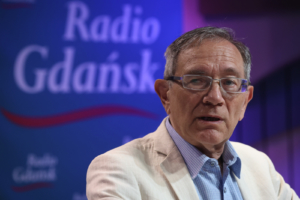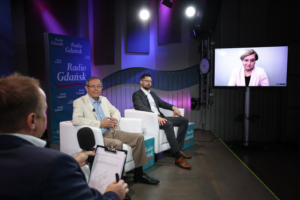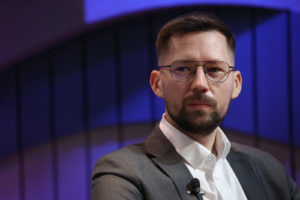Chemical weapons and post-war substances on the bottom of the Baltic Sea. The fourth debate at the 2nd Maritime Forum of Radio Gdańsk



The meeting at Radio Gdańsk was attended by: Anna Fotyga – Member of the European Parliament, prof. Marek Grzybowski, – president of the board of the Baltic Sea and Space Cluster and Michał Antecki – director of the PGE Baltica Offshore Wind Farm Department. The debate was moderated by: Artur Kiełbasiński, editor-in-chief of Dziennik Bałtycki.
– The will of the European Parliament was very important when it comes to political decisions. Earlier, the European Parliament submitted two petitions on the pollution of the Baltic Sea, one from 2019 and the other from 2020. However, we made sure that the petitions took a further course. As a result, a substantive resolution was prepared, which was adopted with the votes of 660 deputies. This is an extremely rare case – said Anna Fotyga during the debate.
– We must take into account the economic and organizational factor when we prepare to remove chemical pollutants from the sea – said Prof. Marek Grzybowski, president of the board of the Baltic Sea and Space Cluster.
– From the economic point of view, I fully agree that funds must be allocated to support Poland in removing this ammunition. It does not belong to us, its owners are countries that have waged war – said prof. Marek Grzybowski.
– As far as the organizational aspect is concerned, I believe that we are prepared to undertake such activities. The technology of neutralization of chemical weapons is getting cheaper and better. We also have better and better devices for detecting small ammunition discharges. The Naval Hydrographic Bureau has purchased an unmanned vessel that can examine the seabed extremely accurately. The Maritime University has such a unit. The research vessel “Oceanograf” scans the bottom very accurately and additionally remembers on the maps the place of detection of the object or individual pieces of ammunition and may return there.
– Investments in offshore wind farms are huge projects. If you compare it to the area of cities, Baltica 1, 2 and 3 are almost twice as large as the area of Gdańsk. This increases the risk that in such a large area we may encounter objects that we will have to deal with. Offshore farm developers cannot be expected to be responsible for cleaning up the entire area. This would skyrocket the investment costs and, consequently, would have an impact on energy prices – said Michał Antecki, director of the PGE Baltica Offshore Wind Farm Department.
More: Broń chemiczna i powojenne substancje na dnie Bałtyku. II Forum Morskie Radia Gdańsk
